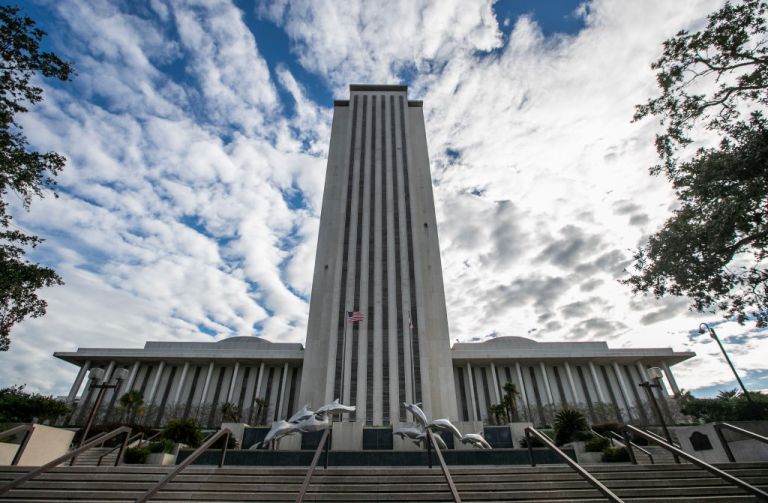What Real Estate Should Know – Commercial Observer
Florida’s legislative session is scheduled to wrap up the first week of May, and lawmakers are spending the final weeks hammering out a roughly $114 billion state budget.
It’s been a busy season for the lawmakers. With Republican majorities in both chambers, there’s not much stopping the legislature from rubber-stamping Gov. Ron DeSantis’s wish list. So far, the legislature has banned abortion after six weeks, restricted transgender health care for minors, legalized concealed gun carry without a permit, expanded school vouchers, limited ESG in government investing, and funded affordable housing.
In addition to the ESG and affordable housing bills, a number of other proposals related to real estate have been on the agenda over the 60-day session. Here’s a roundup of these proposals, which touch on vacation rentals, condo regulations, commercial rent tax, property insurance and foreign investment.
While there’s no guarantee of any bill passing, given the Republican stronghold in the state, it’s highly likely that any bill that’s been prioritized will see DeSantis’s pen.
Vacation rentals
Florida’s existing regulations for vacation rentals are fairly lax, with few restrictions on either individuals or landlords in renting units through platforms like Airbnb or VRBO. This is largely due to 2011 legislation that preempted local authority in the matter, which was slightly amended in 2014.
Currently, similar proposals moving through both the House (HB 833) and Senate (SB 714) would redefine the regulatory authority of local municipalities. Among other proposals, the bills would allow cities and counties to require registration and licensing for hosts, but at a cost of no more than $50 per unit or $100 for collective registration — for an unlimited number of units. Another would lift occupancy limits and require local governments to regulate issues like trash and parking at vacation rentals no differently from typical residential homes.
Pinellas County Sen. Nick DiCeglie, the Senate bill sponsor, claims the legislation would give local governments more control over regulation, but some local officials say it would do the opposite. The question of control has been up for debate since at least 2011, and is of considerable significance given Florida’s popularity as a tourist destination, making vacation rentals both an important source of revenue as well as a factor in the state’s housing affordability crisis.
South Florida is particularly saturated with short-term rentals. Miami Beach had roughly 6,425 active vacation rental listings in April, while Miami, where developers have been marketing condos to prospective buyers as investment units, had close to 15,000, according to data from vacation rental tracker AirDNA. That translates to about 15 percent of all housing units (rental and owner-occupied) in Miami Beach and 8 percent in Miami (concentrated in areas like Brickell and Downtown Miami), according to census data.
The Senate bill is currently scheduled for a vote, while the House bill is still in committee.
Condo regulation
The Senate approved a bill (SB 154) tweaking condo regulation laws passed in the wake of the collapse of the Champlain Towers South. In the 2022 legislative session, lawmakers approved a legislative package governing condo associations, including how condo buildings are maintained, how often they need to be inspected, and how budgets and reserves are managed.
The swift changes resulted in many cases in condo associations levying high special assessment fees on homeowners, in order to meet reserve requirements and/or address building maintenance issues — drastically changing the economics for owners.
The new law would give local agencies more flexibility in enforcing the new state regulations, and allow municipalities to require inspections at 30 rather than 25 years for some buildings. Prior to the 2022 regulation, condo buildings of a certain height were required to be inspected at 40 years and every 10 years thereafter.
A House version of the bill (HB 1935) is expected to be approved before the end of the legislative session.
Commercial rent tax
In Florida, businesses currently pay 5.5 percent tax on commercial rent, a decrease from earlier years. In 2021, the legislature passed a bill to trim the rate to 2 percent once the state’s unemployment fund was replenished to pre-pandemic levels, which is expected in 2024. In the interim, the current House tax bill (HB 7063) includes a provision that would decrease the tax to 4.5 percent until the 2 percent rate kicks in.
Foreign investment
Florida lawmakers have introduced legislation that would restrict residents of seven countries from owning or buying property in Florida. The pair of bills, HB 1355 and its Senate companion SB 264, would prohibit anyone living in those countries — including China, Russia, Venezuela and Cuba — from acquiring land or buildings in Florida if they’re not a U.S. citizen or permanent resident.
The Senate version passed April 12, while the House version continues to move through the chamber.
Preservation
A safe structure bill (SB 1346), introduced by a senator representing Miami-Dade County, could pave the way for a wave of demolitions and development, particularly along the coast.
The bill would restrict local governments from stopping demolitions on private property if the property is in a coastal area and fails to meet federal safety standards for new construction or if local officials deem it unsafe. Even more critically, the bill would prohibit local agencies from imposing limits on what can replace those demolished structures (beyond existing zoning laws), which could certainly act as an incentive for developers.
While the bill is designed to make it easier to demolish unsafe structures, critics are concerned it could lead to the demolition of historic properties. It could particularly impact Miami Beach where 2,600 buildings are designated historic, Miami Beach Commissioner Alex J. Fernandez told Axios. “We’re talking about nearly every building on Ocean Drive,” he said. “The Delano hotel and places like the Ritz-Carlton, the Raleigh Hotel … They could disappear with this preemption bill.”
The Senate bill has passed the legislation, while its sister bill in the House (HB 1317) is in committee.
Environment
Florida is known for its natural beauty and resources, and the state has taken a variety of steps to preserve and manage those resources. In 2021, the state passed Florida’s Wildlife Corridor Act to help protect a network of 18 million acres across the state that allows natural wildlife to flourish and interact. About 10 million acres are already conserved, while the other 8 million acres are considered “opportunity areas.” The House introduced a bill (HB 7047) that would allocate $100 million annually from the Florida Forever bond for the conservation and maintenance of those lands.
Another House bill targets the protection of coral reefs by requiring additional studies for deepwater dredging projects. The bill (HB 979) would have more effect on infrastructure projects such as ports and fishery operations, but could also affect commercial real estate development, which relies on beach restoration and other coastal projects to protect oceanfront properties. The bill is intended to salvage what remains of Florida’s extensive 350-mile coral reef, which has declined by as much as 95 percent, according to some estimates.
There are also bills requiring the removal of tires from the ocean from a failed reef protection project, and to fund the study of seagrass restoration.
ESG
DeSantis has signed a bill (HB 3) prohibiting government fund managers from considering environmental, social and corporate governance (ESG) factors in investment decisions, as well as preventing any government entity from considering ESG factors in contract procurement. The reasoning is to prioritize financial over ideological decision-making, per the fiscal impact statement.
Critics say the legislation could have immediate economic consequences, costing the state as much as $360 million in additional interest charges on municipal bonds alone, partly due to lack of competition. Similar legislation in Kansas has been estimated to reduce the returns of its pension system by $3.6 billion over the next 10 years.
Both the Senate and House versions of the bill were voted on along party lines, and signed by DeSantis in April. The law goes into effect July 1.
Affordable housing
In March, lawmakers passed the Live Local Act, a $711 million affordable housing bill that funds development programs and provides tax incentives for developers of affordable projects. The legislation gives local agencies some flexibility in how they regulate density and other zoning issues, but bans rent caps. The response to the bill has been largely favorable, but the measure can only go so far in addressing the state’s housing crisis, according to experts.
“At the very least it shows that the State of Florida has now taken action,” said Alan Hooper of Fort Lauderdale-based Urban Street Development. “They’re now at a game where they were essentially absent for many years.
A portion of the bill allows multifamily developers to increase density on a commercial property to match the maximum zoning within a mile of the property if at least 40 percent of the proposed units are affordable. That will allow developers to build on cheaper land, outside of the dense urban areas, Hooper said. “If it pencils out, it will be a game changer.”
Chava Gourarie can be reached at [email protected].



